[Event Report] 2023 Sustainable Development Goals (SDGs) Int'l Forum SDGs 雙日國際論壇活動報導
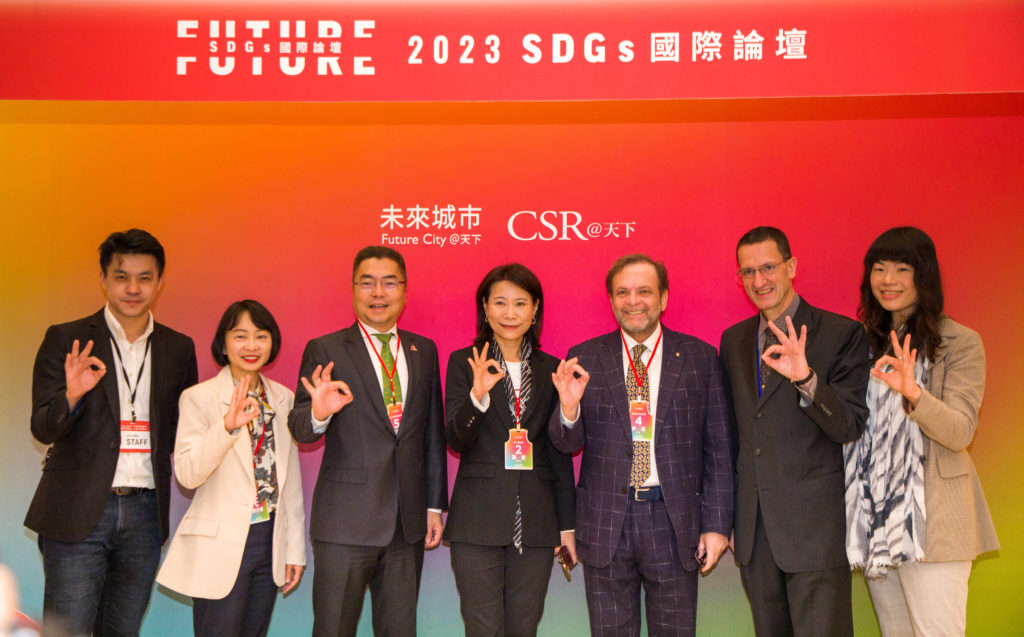
1
1
The 2023 Sustainable Development Goals (SDGs) International Forum (永續國際論壇) was organised by CommonWealth Magazine (CWM)(天下雜誌) in cooperation with the ECCT’s Low Carbon Initiative (LCI)(低碳倡議行動) for the fourth consecutive year. The two-day event is the most prominent annual event in Taiwan a covering wide-range SDGs policies and industry practices that engages prominent political, business, and non-profit organisation leaders from Taiwan and abroad. This year’s event was attended by over 200 guests and experts from government, industry and NGOs.
1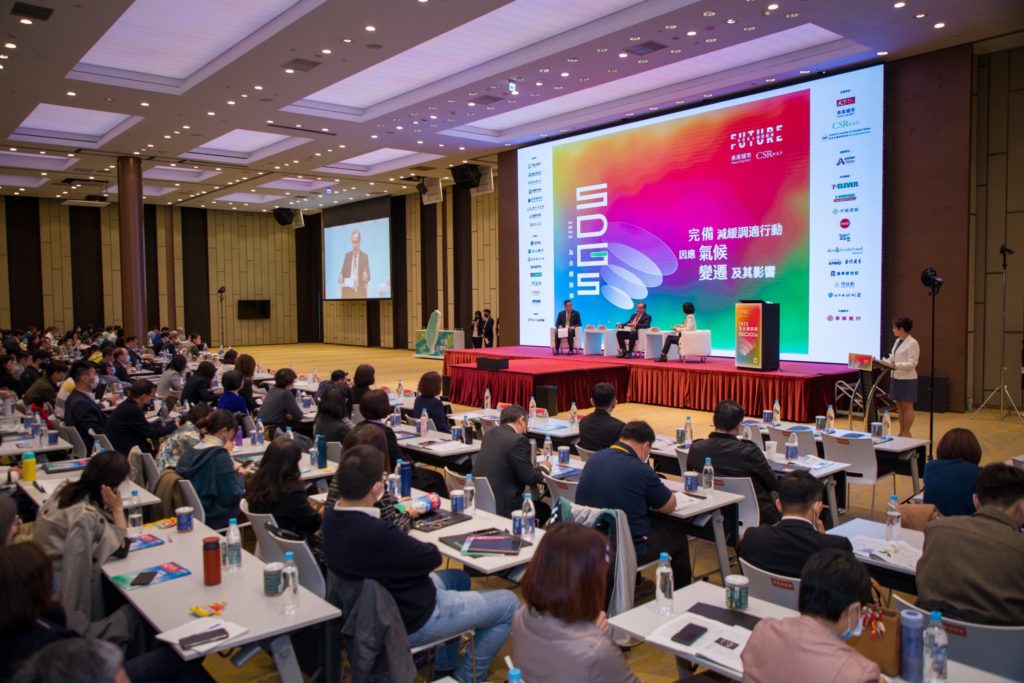
Over 200 guests and experts attend the forum
1
At the event opening remarks were made by Cheng Wen-tsan, Vice Premier of the Executive Yuan (行政院副院長 鄭文燦) and Sara Wu, Co-chair of the CommonWealth Group. This was followed by eight sessions focusing on a wide range of sustainability topics, including the energy transition, ESG in agriculture, digitalisation to achieve net zero, low carbon business models and GHG emission reporting.
1
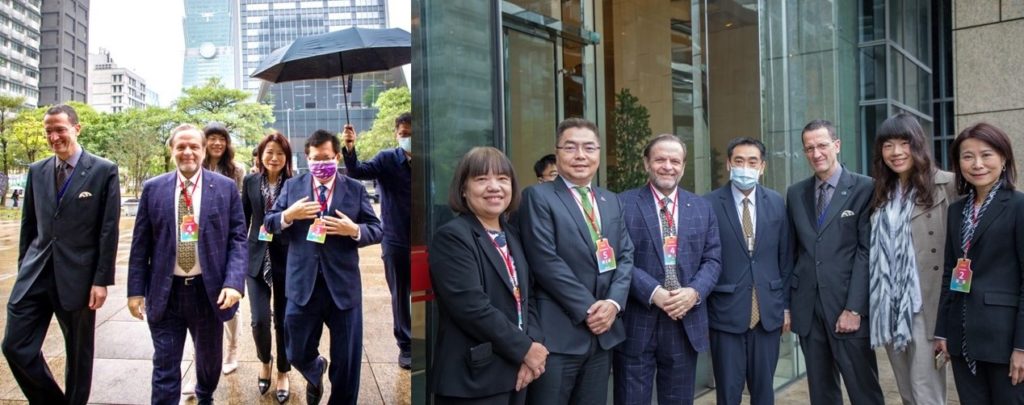
Tommy Lin, Vice Chairman of Hua Nan Bank (middle) being the exclusive partner of the forum
1
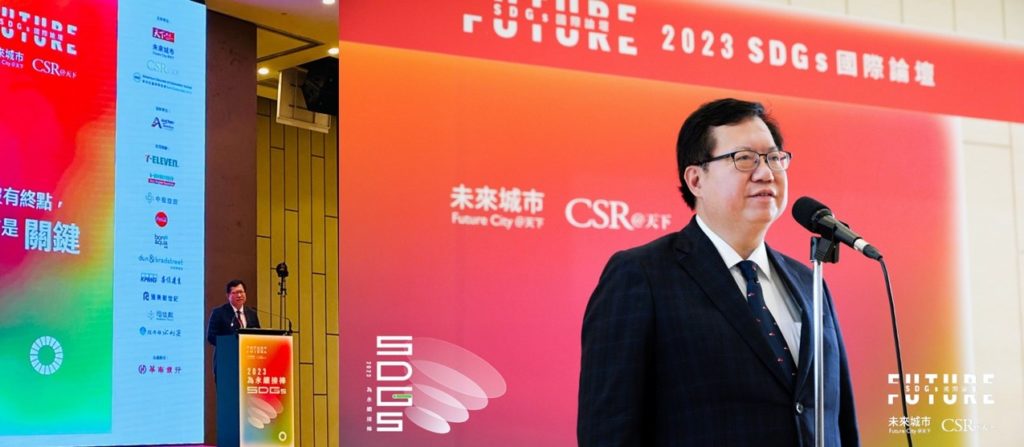
Cheng Wen-tsan, Vice Premier of the Executive Yuan giving opening remarks
1
ECCT Chairman Giuseppe Izzo gave a keynote speech in the first session on how European companies are preparing for net zero. Following his speech, the chairman took part in a panel discussion on the subject of climate action together with Vincent Shih, the Chairman of AmCham. Other sessions featured presentations by mayors and deputy mayors from eight of Taiwan’s major cities and counties, officials from the Water Resources Agency, the Council of Agriculture, the Ministry of Digital Affairs and the Judicial Yuan, representatives from NGOs and corporations including Swire Coca Cola and KPMG, among others. One of the highlights was the "SDGs commitment for Danshui River" endorsed by the Water Resources Agency Director-General Dr Lai Chien-Hsin (水利署署長賴建信).
In his presentation in the first session, ECCT Chairman Izzo summarised some of the ways that European companies are preparing for a net zero future. He noted that the ECCT has welcomed Taiwan’s pledge to reach net zero by 2050, along with the majority of countries in the world and that all European companies now have plans in place to decarbonize their operations globally in order to meet net zero goals. Last year the ECCT released its Net zero by 2050 best practices report which contains chapters from 18 ECCT members on how they plan to reach net zero emissions.
To realise net zero goals, the chairman emphasised that Taiwan will need to ramp up existing technologies, such as wind and solar energy as well as breakthrough technologies in the areas of energy storage, hydrogen energy, energy efficiency, floating offshore wind energy, and carbon capture, utilization and storage (CCUS), among others. He stressed that to attract the necessary investment, requires a sound policy and financial framework and an attractive and investment friendly market. In this regard, he reiterated recommendations from the ECCT’s 2023 position papers on Taiwan’s energy transformation, which will be the most important driver for Taiwan to reach its net zero goals.
In particular, speeding up Taiwan’s energy transformation will require translating commitment into action through coordinated and effective leadership and flexibility in balancing local development objectives with the need for speedy results. In terms of renewable energy, he said that to speed up the pace of renewable energy capacity expansion, all types and forms of renewable energy should be developed to the maximum extent possible (including solar, onshore & offshore wind (fixed and floating foundations) and geothermal). In addition, authorities should remove the cap on offshore wind energy auction prices, shift from itemised localisation to a market-driven percentage of capital investment approach and streamline the permitting process for wind energy projects, including creating “green zones” with simplified permitting requirements.
He also reiterated recommendations to support electric mobility including modifying incentive schemes and tax policies to spur the sales of EVs and build charging infrastructure, and reform of existing land and building use regulations to allow charging stations to be built on rural land as well as in cities.
1
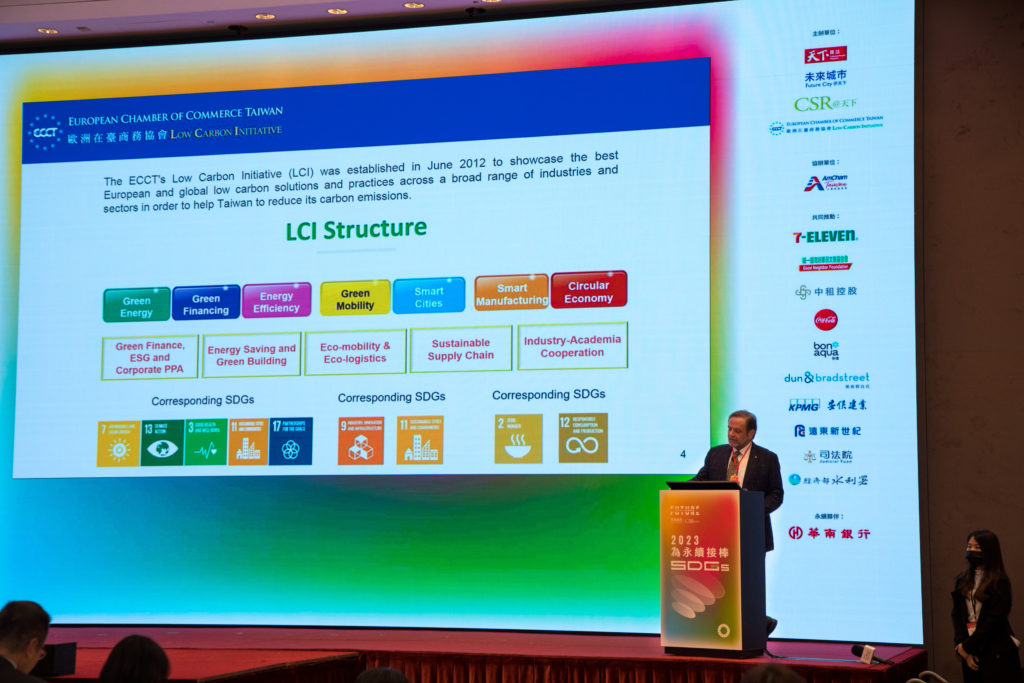
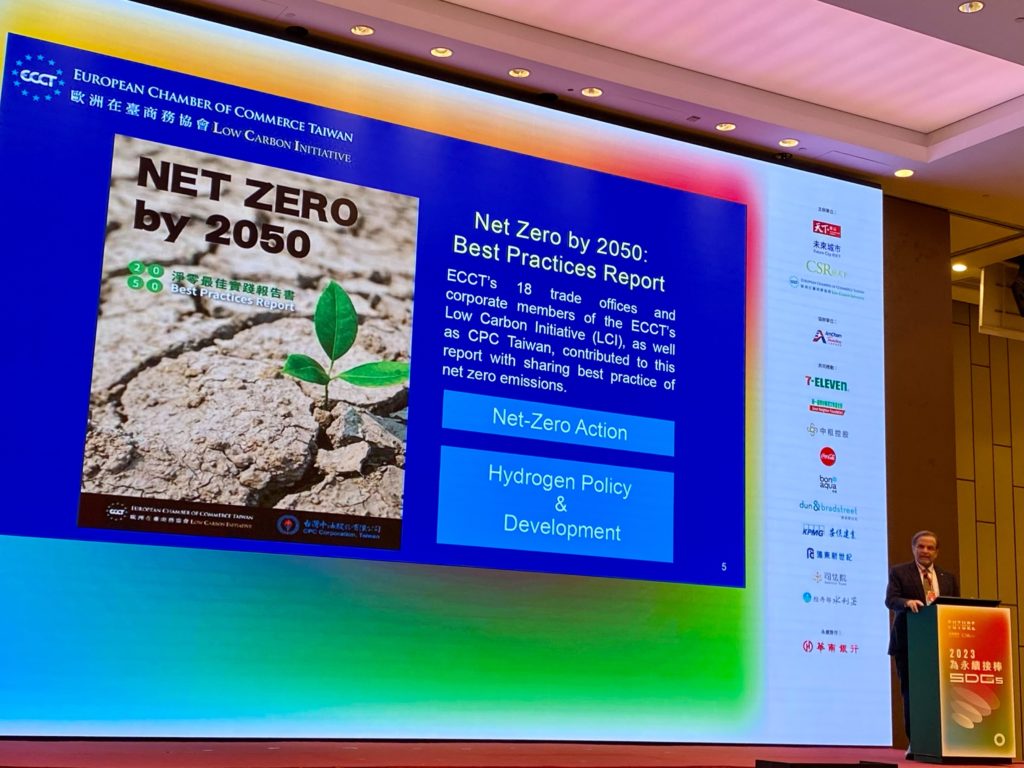
ECCT Chairman, Giuseppe Izzo, introducing LCI and Net Zero by 2050 Best Practices Report
1
On a question during the panel discussion as to how European companies are helping Taiwan in the transition to net zero, Izzo said that Europeans are the largest investors in offshore wind energy, which will benefit both the government and local and foreign companies to switch from fossil fuels to renewable energy but that the contribution of European businesses extends to all other industry sectors where European companies are involved. European countries and companies have been pioneers in moving towards more sustainable practices and practices in Europe are also implemented in Taiwan and the ECCT has been active in helping both the government and local corporate partners to transition to a low carbon economy. Many of the chamber’s advocacy efforts are aimed at persuading Taiwan authorities to implement policies from Europe that have helped to speed up the energy transition and other ways to reduce emissions. Meanwhile, since Taiwanese companies are partners or part of global supply chains, European companies are actively sharing best practices on how to reduce carbon emissions across every industry and business activity.
On a question as to what has been done well and where there is room for improvement in Taiwan’s net zero quest, Izzo said that various policies and, most recently, with the passage of the Climate Change Response Act, had set the overall direction and alignment with other developed countries and also provided some motivation for Taiwanese companies to begin lowering their carbon footprints. However, there is much more that both the government and corporations need to do. For the government there are too many regulatory impediments that are slowing down the energy transition and not enough incentives to encourage industry to decarbonise their operations. In terms of renewable energy, for Taiwan to remain an attractive investment destination, Taiwan needs to speed up the deployment of all viable types of renewable energy. This is the single most important issue for both for foreign and local investors who wish to reduce their carbon footprints.
Taiwan also maintains a regulatory environment that is not friendly to renewable energy. In particular, Taiwan’s local content requirements are slowing down the roll-out of renewable energy and making it more expensive. Taiwan also maintains an overly restrictive permitting process for both onshore and offshore wind energy projects. This works against Taiwan’s own goals. Switching to electric vehicles makes sense for Taiwan given its small size. However, support is needed to spur the sales of EVs and build charging infrastructure. Another often overlooked area is energy efficiency. But currently there is little incentive for heavy power users to improve efficiency when electricity prices in Taiwan are so low.
1
 The panel discussion of Climate Action
The panel discussion of Climate Action
1
The second session focused on the concepts of diversity, fairness and inclusiveness for the formulation and promotion of urban policies. It featured speeches from the Magistrate (mayor) of Pingtung County, Chou Chun-mi; Magistrate of Yunlin County, Chang Li-shan; Mayor of Keelung, City, Hsieh Kuo-liang; Deputy Mayor of Taichung City, Wang Yu-min and Deputy Mayor of Taipei City, Lin Yi-hua.
In the third session on the topic of how cities are promoting a net zero transition of industries in their cities, speeches were made by the Mayor of Kaohsiung City, Chen Chi-mai; Deputy Mayor of Taoyuan City, Su Jun-pin and the Director of the Environmental Protection Bureau of New Taipei City, Cheng Da-wei.
1
 (L-R): Magistrate of Yunlin County, Chang Li-shan, Deputy Mayor of Taichung City, Wang Yu-min, Deputy Mayor of Taipei City, Lin Yi-hua, Magistrate (mayor) of Pingtung County, Chou Chun-mi
(L-R): Magistrate of Yunlin County, Chang Li-shan, Deputy Mayor of Taichung City, Wang Yu-min, Deputy Mayor of Taipei City, Lin Yi-hua, Magistrate (mayor) of Pingtung County, Chou Chun-mi
1
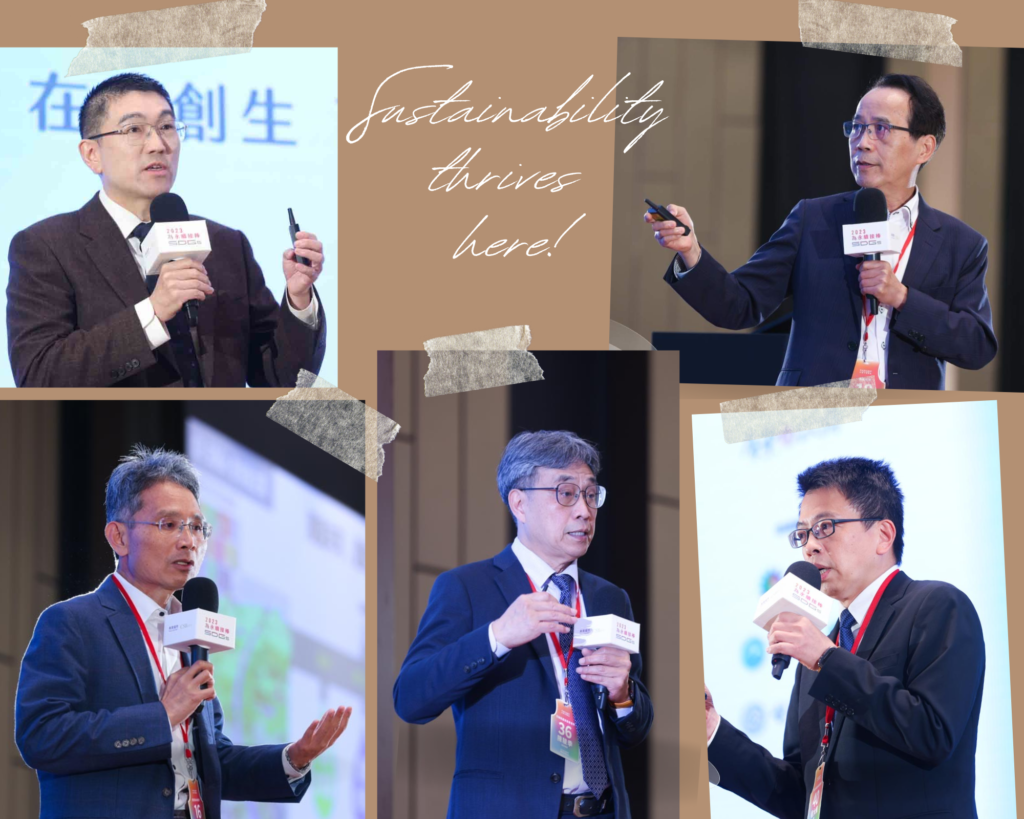
(L-R): Mayor of Keelung City, Hsieh Kuo-Liang, Water Resources Agency Director-General, Lai Chien-Hsin, Deputy Minister of Council of Agriculture Executive, Yuan Li Tui-zhi, Director of the Environmental Protection Bureau of New Taipei City, Cheng Da-wei, Deputy Mayor of Kaohsiung City, Lin Chin-Rong
1
In the fourth session on the topic of the energy transition, panellists Chen Feng-long, Chairman of Chailease Holdings and Xie Zong-zhen, CEO of Yonghong Intelligent Co., Ltd. spoke about how digitization, negative carbon technology, and energy integration, can increase the supply of zero-carbon energy, strengthen energy resilience, create affordable clean energy, and achieve the goal of carbon neutrality.
1
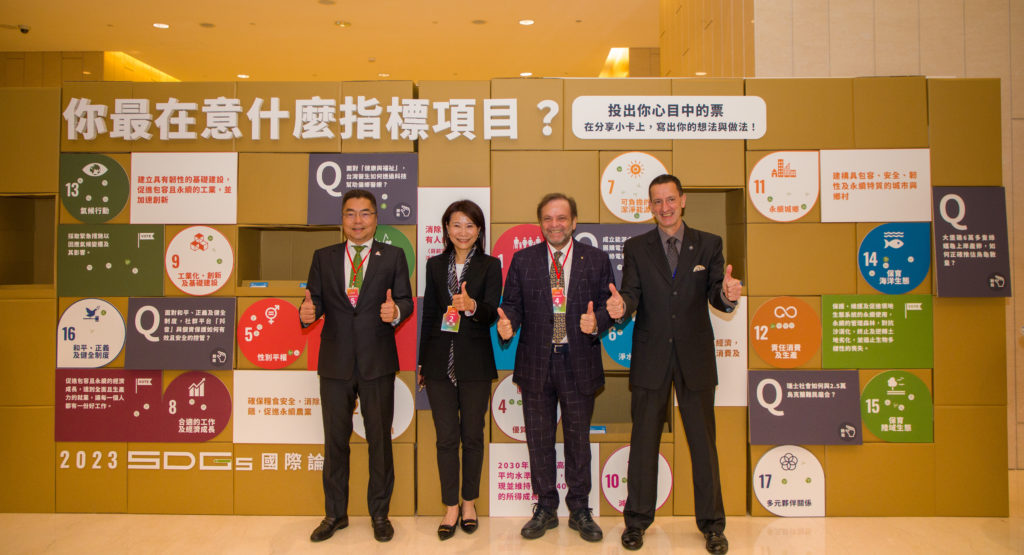 1
1
